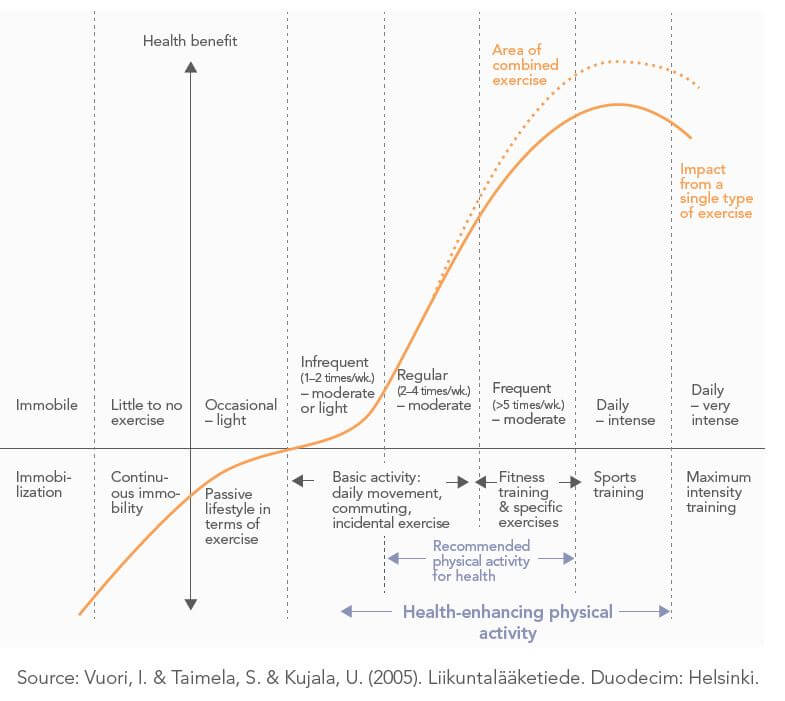6 mins read
The Cumulative Benefits Of Exercise On Health

- Cumulative Benefits Of Exercise
- Mental Health
- How Does Exercise Help Depression?
- How Does Exercise Help Anxiety?
- How Does Exercise Help Lower Cholesterol?
- How Does Exercise Help The Immune System?
- How Does Exercise Help You Lose Weight?
There is now increasing evidence that suggests being consistently active over a lifetime provides more health benefits than intense periods of exercise during a part of your life (for example, only being active during your 20s and 30s). This doesn’t have to be intense exercise either, even moderate amounts of exercise done consistently can add up to better health over time.
In this article we look deeper into the cumulative impact of consistent exercise on physical health, mental health and immune health.
Cumulative Benefits Of Exercise
So, what are the cumulative benefits of exercise on health and can too much have a negative impact?
The health benefits of regular physical activity include:
- improved sleep
- reduced stress
- increased energy
- increased mental alertness
- weight loss
- reduced cholesterol levels
- improved cardiovascular and respiratory fitness
- improved mood
- increased libido
- improved bone and muscle strength
These benefits are driven by the response of hormones to exercise. In addition, studies have shown that being physically active lowers the risk of premature death, reduces the risk of developing coronary heart disease, hypertension or type 2 diabetes and lowers the risk of developing types of cancers such as colon and breast cancer.
According to a study into the cumulative impact of exercise on health, physical activity begins to positively impact health when moderate exercise is carried out 1-2 times per week. This moderate activity is classed as ‘basic activity: daily movement, commuting, incidental exercise’.
There is a steep increase in health benefit when a single type of moderate exercise is taken regularly (2-4 times per week) to frequently (>5 times per week) with a higher increase if more than one type of exercise is carried out.
However, the health benefits begin to slow and decline if daily, intense exercise is carried out, such as sports training, and the benefits actually begin to decline with very intense daily exercise of a single type.

When it comes to exercise volume, there is a dose-response relationship. That means the more you do, the more benefits you will reap but only to a maximum point. Beyond this and exercise could do you more harm than good. The point is called overtraining syndrome and is caused by getting too much exercise with too little recovery or chronic under-fuelling (not taking on board enough energy through food to match the amount of exercise being undertaken), also known as relative energy deficiency in sport (RED-S). For more details visit British Association of Sport and Exercise Medicine website.
Recognising and dealing with the early signs of overtraining can prevent any long-term detrimental effects to your health and fitness.
If you exercise and don’t get enough rest between sessions, then you may experience:
- Fatigue
- Heavy, sore, stiff muscles
- Lack of concentration
- Agitation
- Loss of motivation
- Irritability
- Difficulty sleeping
Overtraining and RED-S can also comprise your immune system, meaning you may suffer from more frequent colds or illnesses as well as experience issues with your muscles and bones e.g. stress fractures.
Building rest days into your weekly routine, taking into account other physical activity and not just planned exercise, will help you optimise your health and reap the benefits of regular, consistent exercise.
Let’s take a closer look at some of the health benefits of regular exercise.
Mental Health
How Does Exercise Help Mental Health?
Studies have shown that physical activity can have a positive impact on our mental health, such as anxiety, stress and depression. Exercise increases blood circulation to the brain, releases endorphins as well as having a positive impact on neurotransmitters (e.g. serotonin) and something called the hypothalamic-pituitary-adrenal axis which has an impact on mood. In addition, exercise helps reduce inflammation in the body which contributes to better health outcomes such as improved mood.
How Does Exercise Help Depression?
A study into The Influence Of Exercise On Mental Health found that regular exercise, done several times a week over a number of weeks helped with depression. Scientists have found that in people with depression the part of the brain responsible for regulating mood, called the hippocampus, is smaller compared to people who do not have depression symptoms. However, research shows that even low-intensity exercise can contribute to the growth of nerve cells and create new connections. So, exercise can help to improve or relieve the symptoms of depression by encouraging new neuronal growth.
How Does Exercise Help Anxiety?
The same study on The Influence Of Exercise On Mental Health found that aerobic exercise carried out over a number of weeks of regular exercise helped reduced anxiety, particularly in those how had low fitness to begin with and suffered from high anxiety.
Exercise helps to relieve the symptoms of anxiety by:
- Diverting your mind away from the thing that is causing your anxiety
- Being active relieves muscular tension and helps to lower the body’s contribution to anxiety symptoms
- Releases anti-anxiety chemicals and endorphins in the brain via your increasing heart rate
- Relieves stressful feelings
- Improves self-esteem and confidence
Physical Health
How Does Exercise Help Lower Cholesterol?
Studies have shown that regular, physical activity and exercise can improve cholesterol levels. Regular physical activity can increase HDL cholesterol levels which helps maintain, and ‘theoretically offsetting’ increases in LDL cholesterol and triglycerides. The study also found that there is a direct dose-response relationship between HDL levels and activity levels, with more intense exercise being needed to reduce levels of LDL cholesterol and triglycerides.
How Does Exercise Help The Immune System?
Research has shown that physical activity improves your immune response, lowering the risk of illness, and decreasing inflammation within the body. Exercise could even help ward off or reduce the severity of the common cold. One study has identified a link between reported health fitness levels and the frequency and severity of a cold. Those who exercise at least five times per week reported fewer days of cold symptoms compared to people who exercised less than once. But, as mentioned above, there is a tipping point and too much exercise with limited rest can have the reverse affect on your immune system.
How Does Exercise Help You Lose Weight?
If losing weight is your goal, then leading a healthier lifestyle is key and includes diet and exercise. A combination of the two is the most effective way to initiate weight loss rather than restricting your diet alone. When you gain weight it’s generally because there is an imbalance between your energy intake (food) and your energy expenditure (exercise). By exercising regularly, you will help to balance these two factors, or by increasing your physical exertion you will help your body to burn more energy as well as the stored fat, enabling you to lose weight.
Summary
It goes without saying that regular physical activity has numerous benefits for your health and wellbeing. It doesn’t only keep your physical health in good condition but also regulates your mental health, reducing symptoms of anxiety and depression as well as boosting your self-esteem and concentration.
But there is a limit where exercise becomes detrimental to your health, especially if rest days are not built into your weekly routine and your energy intake through diet is insufficient to sustain the amount of energy used during physical activity.
The trick is to identify what works for you, and if you are new to exercise, then start with simply increasing the frequency of moderate exercise each day to help improve health. And don’t forget, this includes those household chores!
Ensuring you are getting the right nutrients through diet will also help boost physical performance by increase your energy levels. Having the right levels of B12, folate, ferritin and vitamin D will all aid in energy production, helping you achieve your training goals.
Article references
-
Anderson, E and Shivakumar, G. (2013). Effects of Exercise and Physical Activity on Anxiety. Front Psychiatry.
-
Couillard, C et al. (2001). Effects of Endurance Exercise Training on Plasma HDL Cholesterol Levels Depend on Levels of Triglycerides. Arteriosclerosis, Thrombosis, and Vascular Biology: 21, pp 1226-1232.
-
Kreher, J, B and Schwartz, J, B. (2012). Overtraining Syndrome: A Practical Guide. Sports Health: 4(2), pp 128-138.
-
Liu, P, Z and Nusslock, R. (2018). Exercise-Mediated Neurogenesis in the Hippocampus via BDNF.
-
Nieman, D, C and Wentz, L, M. (2019). The Compelling Link Between Physical Activity and the Body’s Defence System. Journal of Sport and Health Science: 8(3), pp 201-217.
-
Sharma, A., Madaan, V and Petty, F, D. (2006). Exercise for Mental Health. Prim Care Companion J Clin Psychiatry: 8(2).
-
Skoumas, J et al. Physical Activity, High-Density Lipoprotein Cholesterol and Other Lipid Levels, In Men and Women from The ATTICA Study. Lipids in Health and Disease: 2(3).
This information has been medically reviewed by Dr Thom Phillips
Thom works in NHS general practice and has a decade of experience working in both male and female elite sport. He has a background in exercise physiology and has published research into fatigue biomarkers.

Dr Thom Phillips
Head of Clinical Services
Related articles
Like this article? Here are some more based on similar topics.



